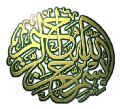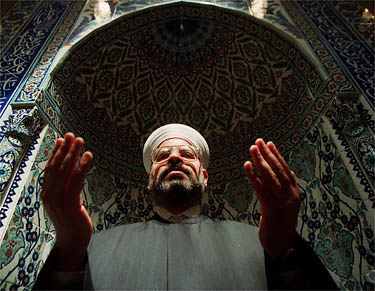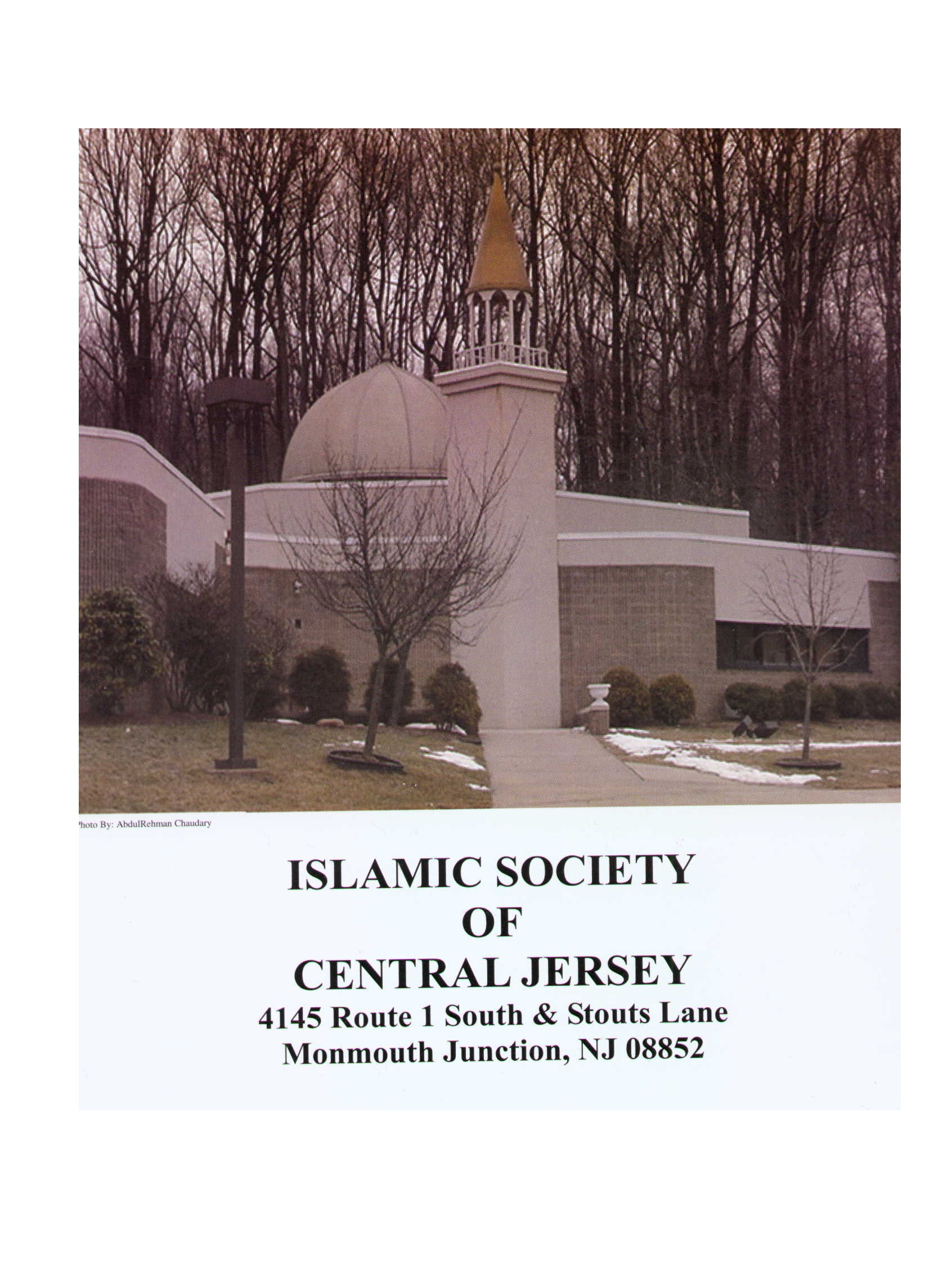The mosque was packed: The fast of Ramadan was over, and inside the Islamic Society of Central Jersey, hundreds of people stood shoulder-to-shoulder, waiting to pray beneath the buildings gold dome.
A towering man in a flowing robe and a white turban strode to the front. Facing the crowdmen in front, women in backhe surveyed the room through thick-lensed glasses. The chatter quieted beneath his gaze, and he turned East, facing Mecca.
Allahu Akbar! (God is great!) He cried, piercing the silence.
His body bent into a reverent bow. Behind him, the crowd followed as one. He made it look easy. Those who know Imam Hamad Ahmad Chebli, the spiritual leader of the Islamic society of central Jersey in South Brunswick, know otherwise. As leader of a diverse and growing 700-member congregation in a nation that knows little about Islam, the 50 year-old Chebli built unityand bridgeswhere neither existed before.
Whether leading prayers at his own mosque or at an interfaith service in a church, speaking at a public school or applying for a variance at a Zoning Board meeting, Chebli has emerged as one of New Jerseys most articulate spokesmen for his faith.
Those who listen learn that Allahu Akbar is more of a Hallelujah! than a battle cry, that the prophet Muhammad taught patience and tolerance, and that Islam encourages its adherents to abide by societys laws.
I remember still to this day when they made the application (to build the mosque), said Roger Craig, a former South Brunswick mayor and Planning Board member. I remember the imam speaking and saying that like all of you in the community, we are oriented towards making a good future for our children and safe community for our members.
Yet Chebli is willing to take a stand, too. He espouses harsher personalities for violent criminals. He questions whether the convicted World Trade Center bombers were treated differently because they were Muslim, and others support for Iraqis or Palestinians.
Bearded and broad-shouldered, Chebli cuts an imposing figure at 6-foot-2 (6-foot-6 with turban). An eminent scholar, he studied Islamic theology at the prestigious Al-Azhar University in Cairo, Egypt. He knows the Koran all 6,000 verses by heart.
Yet he quotes talk radio or ABCs Nightline almost as often as he quotes Muslim scripture, and he easily jokes about his Lebanese accent. (Thats tourists, not terrorists, he told a reporter with a guffaw once during a telephone interview about tensions at tourist sites in Israel.)
A father of six, including four in South Brunswick public schools he is at home at the wheel of his American-made minivan.
Inside the mosque, he bends easily to the floor to tickle a toddler. And Peace be with you, sister, and You are welcome, brother! and uttered with hearty gusto several times each day.
His articulate voice and open-door policy have paid off good will and choice invitations.
When people attending mosque events parked their cars in neighboring Princeton Gate, a tony housing development surrounding the mosques 6-acre lot, Sylvia Lee, homeowners association president, paid a visit to the Imam. His quick response solved the problem and earned the neighborhoods support when the mosque sought to expand its parking lot and keep a movie theater from breaking ground nearby.
Chebli was invited to speak at an interfaith service preceding Gov. Christie Whitmans second-term inauguration and to offer prayers on the floor of the Congress. He welcomes Jews and Christians to his mosque and to his table, and he has been known to give bear hugs to Catholic Priests.
I almost got lost in his robes, said the Rev. John Polyak, pastor of Our Lady of Peace Roman Catholic Church in North Brunswick.
Polyak, a fellow member of the South Brunswick Clergy Association, encountered the open-armed Chebli at the popes outdoor Mass in Giants Stadium in October 1995 about the last place he expected to see his Muslim friend.
Chebli, who serves on two interfaith groups in Middle East peace and participants in a Muslim/Catholic dialogue sponsored by the Archdiocese of New York, was part of a delegation of Muslim leaders invited to the Mass. He had a front-row seat.
This is a person who is really on the leading edge, the ones that do this kind of work, said Ibrahim Hooper of the Council on American Islamic Relations in Washington.
The council was formed four years ago to educate the American public about Islam and battle anti-Muslim discrimination. Muslim leaders like Chebli who came to the United States in 1982, helped pave the way for such work.
Hooper, who does not know Chebli personally, said many immigrant Muslim leaders focus on internal concerns mosque building and religious education, for example and tend to leave interfaith outreach for times of crisis. Those who take proactive stance, as Chebli has, can help avert bias and dispel problems before they arise, Hooper said.
Thats why I do this, outside the building more than inside the building, Chebli said recently as he sat in his small office. I get the feeling they need us, and we need them. Why keep Islam in jail?
In a single month this summer, Chebli received a 3-inch-high stack on invitations to speak at every thing from a mosque dedication in Guyana (he accepted) to a meeting of the New Jersey Catholic Conference (he declined).
It was a typical month. In between speaking engagements, he gives a weekly radio show Reading from the Koran at 7:05 p.m. each Saturday on WING-AM 1300.
Later this month, he will address the 1998 national convention of the American Muslim Council in Washington, sharing a dais with FBI Director Louis Freeh and CNN correspondent Chritiane Amanpour.
Riaz Siddiqui of Ewing, a mosque board member and former president, was among those who helped interview and hire Chebli in 1986. Chebli, at the time of Imam of a small mosque in New Orleans, impressed the hiring committee with his energetic yet flexible style.
He doesnt say, Thats not my job. He doesnt know that phrase, Siddiqui said. Whatever it is, he takes ownership, at times to the chagrin of the board of trustees or other people. If he sees a hole, hes willing to fill it.
The griping, although rare, comes when Cheblis busy schedule prevents him from performing a marriage or funeral, giving marital counseling, teaching a class, leading prayers or doing any of the myriad things he was hired to do.
At time people complain, but they complain that they miss him, Siddiqui said. He cant do everything.
The Arabic term Imam translates roughly to prayer leader, and Chebli is fond of pointing out that any educated man would be qualified for the job. Like Judaism, Islam values scholars more than preachers and has no formal hierarchy.
Men in congregation, including Cheblis oldest son, Ahmad, 18, have led prayers at the mosque.
Wisdom of Solomon
While Islamic tradition reserves mosque leadership for men, women are key players in the mosques growing day school. His wife, Mona, participates in womens groups. His daughter, Maryam, 14, is principals assistant of the mosques weekend religious school for children.
A major part of Cheblis job and one of his skills most appreciated by the mosques members is his ability to soothe tensions inside the mosques walls. The centers members may pray together and respect Islams core teachings prayer, fasting, charity, faith and pilgrimage to Mecca but they speak several languages and interpret Islamic teachings in different ways.
Mohammed Siddiqui an AT&T systems manager from South Brunswick, and the mosques treasurer, praises Cheblis ability to keep the peace.
Its a very tough job to run a society with two different levels of faith in the religion, Siddiqui said. Imam is a pivot in that he gets pressure from both sides.
Style of dress is a hot topic, Siddiqui said. The Koran requires men and women to dress modestly, a demand that has been interpreted in different ways according to time and place. Some of the differences are cultural in general, Muslims from India to Pakistan interpret the dress requirements more loosely than those from Saudi Arabia or Egypt.
At prayer services marking Ramadans end last year, for example, some women tightly covered their hair beneath white scarves, while others draped colorful or sheer scarves loosely around their heads.
Earlier this year, a poster went up near the mosques front door pointing the rules of etiquette. The sign discourages jewelry and make up in the mosque, asks women to wear long sleeves, skirts and head coverings, and
encourages men to dress modestly as well.
The sign has pleased mosque members on both ends of the religious spectrum. Privately, moderates say it allows them flexibility, while more orthodox Muslims are pleased to see minimum standards set.
Yasser Elmenshawy of Woodbridge, chairman of the Majlis Ash-Shura, a coalition of Islamic organizations in New Jersey, noted that dress codes are stricter in mosques in North Jersey. He said Chebli is popular for raising the standard in a way that did not alienate more moderate members.
He tells people their responsibilities outside the
mosque but doesnt try to pry into their lives, Elmenshawy said.
The Making of a scholar
Chebli was born Jan. 26, 1948, in Tripoli in northern Lebanon. The son of a sheep trader who couldnt write Arabic but dreamed that his three sons would become Muslim scholars, Chebli was sent to religious boarding school in Beirut as a young boy.
Early in his studies, a teacher named Hassan Khaled chose Chebli to serve at a neighboring mosque. Nearly four decades later, Chebli laughs as he recalls the puzzled expression of the mosques members when a lanky boy in glasses came to lead their prayers.
Later, Chebli traveled to Egypt to study at Al-Azhar, the worlds oldest university. During those years, Khaled, his mentor, was chosen Grand Mufti of Lebanon, the nations foremost Islamic legal scholar in the Sunni Muslim sect. Sunnis, who make up the majority of the worlds Muslims, are a minority in civil war-torn Lebanon, numbering about 700,000.
In 1982, when the Muslim World League was searching for prominent scholars to go to the new world and serve a growing Muslim population in the United States and Canada, Khaled, one of the leagues founders, recommended two of his favorite students: Chebli and Talal Eid.
Like Chebli, Eid, now the Imam of the Islamic Society of New England, is involved in interfaith work. A graduate of Harvard Divinity School and a well-known religious leader in the Boston area, Eid last year became the first Muslim to offer the invocation at Harvard University graduation ceremonies.
Their mentor, Khaled, set the example. In deeply divided Lebanon, he moved freely among Shiite or Sunni Muslims and Christians or various sects. He advocated nonviolent solutions to Lebanons civil war.
Khaleds work cost him his life. In 1989, he and 21 others were murdered when a bomb exploded inside Khaleds car. In an unprecedented display of unity, Muslims and Christians in Lebanon closed up their businesses, flew flags at half-staff and played songs of mourning on their competing radio stations. More than 100,000 people marched through Beirut behind his flag-draped coffin.
His quietness, Chebli said, when asked which of Khaleds qualities inspired him most. He never shouted at us. He spoke very softly. He showed us a great example of how to be a leader. He talked to us kids like a grandfather. He took us under his shelter. He tried to cover our faults.
Under Chebli's example, members of the Islamic Society of Central Jersey are also building bridges with the wider community serving on library boards, sponsoring educational programs, organizing a weekly health clinic that is free and open to all.
Still, from time to time a vandal will break a window in Cheblis car or uproot his mailbox or steal a sign from in front of the mosque. Trying not to lose his temper, Chebli thinks of home, his teacher and of his next opportunity to teach a lesson about Islam. He takes bias incidents seriously but in stride.
"We live with that, Chebli said. We came from a country of people shooting each other with live bullets. We learned to survive, and we will survive here, God willing."
Imam Hamad Activities Imam Jamal Ahmad El-Chebli |



